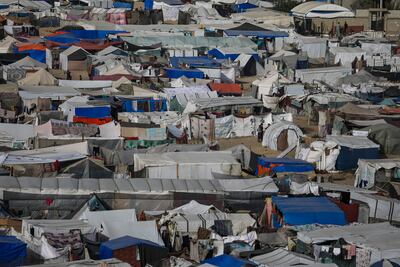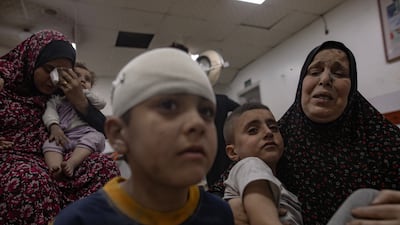Live updates: Follow the latest from Israel-Gaza
Palestinians who sought safety in the southern city of Rafah at the beginning of the war are now preparing for an expected Israeli ground invasion, unsure to where they can flee as strikes and shelling continue across the war-torn enclave.
At least six people were killed and several more wounded in dawn strikes on the city on Thursday as residents say the army is upping attacks across Rafah.
Five others were killed in strikes elsewhere in Gaza, including Wadi Gaza and Nuseirat refugee camp.
Hadi Ibrahim, 40, fled from Gaza city to Rafah five months ago, and is worried the city will come under attack.
"We are worried about the Israeli threats to invade Rafah. We are aware that Israeli forces have committed massacres in areas they have invaded, showing no respect for international law," he told The National.
"I have already packed our belongings, and we are prepared to flee at any moment if we feel we are in danger. But honestly, we do not know where to go."
About 34,300 people have been killed since Israel began its offensive in Gaza, figures compiled by the enclave's Health Ministry show. The Israeli military began its operation after Hamas-led groups carried out an attack in October, killing 1,200 people.
Israel is “moving ahead” with the Rafah operation and has bought 40,000 tents for civilians who will be displaced from the city, Reuters cited an Israeli government official as saying, corroborating widespread reports in Israeli media of an imminent invasion and the construction of tent cities.
The defence official said the Israeli military could begin immediately but was waiting for approval from Prime Minister Benjamin Netanyahu, who has said a “date has been set” for the invasion.
Hussam Abed Al Aziz, fled Gaza city for Khan Younis before moving into a tent in Rafah. He is deeply frustrated with the situation.
"Let the war end. If invading Rafah will bring an end to the war, then let them do it and kill all of us," he told The National.
"We are enduring scorching weather inside the tent. Who can tolerate this situation? We left our homes and came here seeking security, and the result is constantly worrying about the safety of your family."
"All we want is to put an end to this suffering, but who will listen to us? Who will care about us? No one cares. All we can do is wait for God's mercy."
The Israeli army announced on Wednesday that reservist brigades previously withdrawn from the Palestinian enclave had been sent back there to fight.
Suliman Jaber, 45, runs a bakery in Rafah, and says he believes the daily shelling of the city is preparation for a ground invasion.
"Before, I felt they would not enter Rafah because it has become the only place of security for one and a half million people. It seems that no one cares about us or our safety," he told The National.
Israel says four of six remaining Hamas battalions are stationed in the city.
On Wednesday, Israeli media reported the government will meet in the coming weeks to approve civilian evacuations from Rafah – the first phase of the invasion.
The UN has reportedly refused to co-ordinate with Israel on civilian evacuations, as it opposes the planned offensive.
“[The UN] is telling Israel, don’t do this,” a person familiar with the matter told The Financial Times.

So-called “humanitarian enclaves” would be set up by “local actors” from within Gaza in absence of UN aid workers, a second source told the newspaper.
Elsewhere in the enclave, dawn strikes were reported on Wadi Gaza as a siege continued in Gaza city.
Shelling and strikes were reported across the city and its surroundings, particularly in Jabilia and Al Zaytoun districts, Wafa reported.
The US and other countries, along with the UN, have publicly called on Israel to abandon its plans to invade Rafah, on the border with Egypt.
On Tuesday, Qatar's foreign ministry said the situation in the city is a “human catastrophe” even without an invasion.
Doha, a key mediator between Israel and Hamas, said an Israeli assault would negatively affect continuing talks aimed at reaching a ceasefire.
On Wednesday, Washington said it had not approved an Israeli attack on the city.
“Absolutely not. I cannot confirm that we have done any such thing. We have not greenlit a military operation,” Barbara Leaf, Assistant Secretary of State for Near Eastern Affairs, said.

